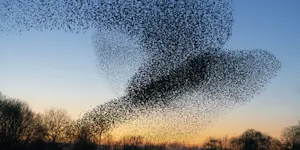What Makes This Word Tick
"Grandiloquent" is a word you might pull out when discussing high-flying or lofty speech. It's synonymous with someone who uses big words, perhaps to sound more intelligent or impressive. It's a fun one to say, rolling off the tongue with a bit of flair, just like the over-the-top language it describes.
If Grandiloquent Were a Person…
If grandiloquent could prance about in a suit and tie, it would wear something extravagant—think top hat and tails. This person would carry themselves with an air of superiority and have a penchant for using a thesaurus in everyday conversation. A dinner party with them might include a monologue about the finest caviar and how one must appreciate the subtle complexities within each morsel.
How This Word Has Changed Over Time
Originally, "grandiloquent" was used more sincerely to describe someone who spoke in an elevated fashion, often tied to eloquence. Over time, the connotations became more humorous or even derogatory, hinting at pretentiousness rather than pure grand speech.
Old Sayings and Proverbs That Use Grandiloquent
A well-known proverb that might have used "grandiloquent" is "actions speak louder than words." Essentially, it's a reminder that no matter how grand one's language might be, it's the deeds that count.
Surprising Facts About Grandiloquent
Despite its showy nature, "grandiloquent" isn't just for the elite. It's often embraced in comedic settings to mock pretentiousness. The word also loves a bit of irony; those who aren't genuinely grand but aspire to appear so might fit the grandiloquent bill perfectly.
Out and About With This Word
Next time you attend a local club lecture or an art soirée, keep an ear out for grandiloquent. It thrives in settings with speeches or gatherings where someone might put on airs. You might even bring the word up yourself if you're feeling particularly cheeky!
Pop Culture Moments Where Grandiloquent Was Used
In television and film, characters like Frasier Crane from "Frasier" or Professor Gilderoy Lockhart from "Harry Potter" brings grandiloquent to life with their love for verbose dialogue, often much to the amusement of their audiences.
The Word in Literature
"Grandiloquent" finds its home in satirical literature, which often mocks the high and mighty. Authors like Oscar Wilde and Mark Twain employed grandiloquent language to embellish or poke fun at their characters' larger-than-life personas.
Moments in History with Grandiloquent
Consider the Gettysburg Address, where Lincoln's simple language was a stark contrast to the grandiloquent orations of the day. Or P.T. Barnum, whose famous advertising often skated the line of grandiloquent—big words promising even bigger glamor.
This Word Around the World
Around the world, grandiloquent might find close kin in languages like French or Italian, both renowned for their lyrical, flowing speech. Each culture has its own way of expressing grandiloquence, often with a twist of regional flair.
Where Does It Come From?
The origins of "grandiloquent" are as grand as the word itself, rooted in the Latin "grandiloqui," which breaks down to "grand" meaning great and "loqui" meaning to speak. It’s been a linguistic tool in English since the late 16th century.
How People Misuse This Word
Often, people throw around "grandiloquent" to mean anything simply grand or impressive, missing the mark on its specific flavor of elevated speech that's a bit too much.
Words It’s Often Confused With
Eloquent: While eloquent refers to polished, fluent speaking, grandiloquent implies unnecessary grandeur.
Bombastic: This word shares a similar idea but leans more towards loud and inflated rather than smooth and lofty.
Ostentatious: Focuses on showy or pretentiousness but isn't limited to speech.
Additional Synonyms and Antonyms
Synonyms include pompous, highfalutin, and pretentious. Antonyms are plainspoken, simple, and unembellished.
Want to Try It Out in a Sentence?
"Though his speech was full of grandiloquent phrases, the audience found it somewhat lacking in real substance."
















